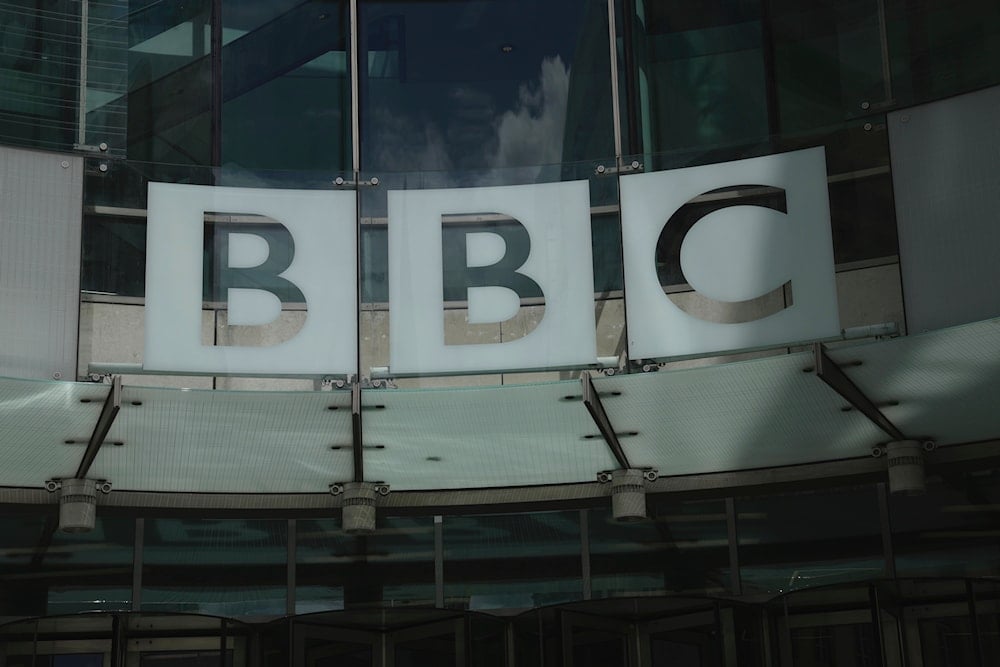38% of BBC viewers say corporation 'ineffective' at being independent
A survey shows that 38% of BBC viewers say the BBC is “ineffective” at remaining independent from the UK government.
-

A logo of the British Broadcasting Corporation is seen at the BBC Headquarters in London, Britain, on July 11, 2023. (AP)
A significant portion of the British Broadcasting Corporation's (BBC) viewers have expressed doubts about the broadcaster’s independence, with 38% saying the corporation is “ineffective” at maintaining editorial separation from the UK government, according to results from the BBC’s latest audience survey.
The findings were revealed in the corporation’s "Our BBC, Our Future" questionnaire, which collected responses from 872,701 participants between March and May 2025. While 38% expressed skepticism about government independence, 43% of respondents considered the BBC “effective” in this regard. Notably, a vast majority (91%) emphasized the importance of the BBC remaining independent from the “Government of the day.”
BBC Director-General Tim Davie acknowledged the survey results, stating, “Our audience wants an independent BBC, delivering high-quality programmes and content that they can trust; that tells the stories that matter to them and that reflect their lives.”
“We are here to deliver for audiences across the UK and we will be taking everything they have told us with us as we shape the future of the BBC,” Davie claimed.
Read more: Activists project censored Gaza documentary onto BBC Scotland office
Public service, representation, global role
The survey also highlighted public perception of the BBC’s mission. Just over half of respondents (51%) said the broadcaster is “effective” in reflecting different parts of the UK and the lives of its citizens, while 24% said it is “ineffective.” The importance of representation was stressed by 76% of participants.
Regarding the BBC’s public service role, 64% felt the corporation provides a “valuable public service,” while 26% disagreed. Similarly, 59% of viewers said the BBC offers “something for everyone,” though 24% disagreed. On the global stage, 57% of respondents described the BBC as an “asset for the UK around the world,” with 21% questioning its effectiveness.
The survey also evaluated digital services, with 73% of respondents saying the BBC provides “high-quality digital services” and only 10% finding them lacking. In content preferences, viewers requested more sports coverage, while over 40% expressed interest in additional drama and documentary programming. Most participants, 67%, supported maintaining current levels of news coverage.
Implications for BBC governance
The results come amid ongoing debates over the BBC’s funding, editorial independence, and political impartiality. While the corporation is publicly funded through the license fee and operationally independent, critics have questioned whether funding proposals, such as linking the BBC World Service to defense budgets, could further influence editorial priorities.
Previous controversies, including internal reviews over coverage of sensitive topics like Palestine and the war on Gaza, have further fueled accusations of bias.
Read more: 400+ media figures urge BBC to remove board member over Gaza coverage
One example of the BBC’s shortcomings in impartial reporting is its handling of the documentary Gaza: How To Survive A Warzone, which focused on the experiences of Palestinian children in the Gaza Strip. The film faced intense scrutiny after it was revealed that one of its featured children, 13-year-old Abdullah Alyazouri, is the son of Dr. Ayman Alyazouri, a deputy minister in the Gaza government.
The BBC’s decision to withdraw the documentary followed pressure from pro-"Israel" advocates, including the Israeli ambassador to the UK, and British officials such as Culture Secretary Lisa Nandy, who indicated she would engage with the corporation over the matter.
At the time, the BBC stated it was conducting “further due diligence” on the production, but the decision sparked widespread debate over media impartiality and the portrayal of Palestinians in British media. The broadcaster acknowledged that the film “features important stories” about children in Gaza, but noted it would not be available on iPlayer during the review.
The BBC later announced that a shorter version of the documentary would be made available, though the original film would remain withdrawn.
Read more: Gary Lineker to leave BBC after controversy over pro-Palestine post

 4 Min Read
4 Min Read










